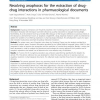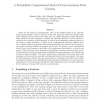925 search results - page 117 / 185 » A Linguistic Theory of Robustness |
ACL
1994
13 years 11 months ago
1994
This paper shows how to formally characterize language learning in a finite parameter space as a Markov structure, hnportant new language learning results follow directly: explici...
BMCBI
2010
13 years 10 months ago
2010
Background: Drug-drug interactions are frequently reported in the increasing amount of biomedical literature. Information Extraction (IE) techniques have been devised as a useful ...
COGSCI
2010
13 years 10 months ago
2010
Words are the essence of communication: they are the building blocks of any language. Learning the meaning of words is thus one of the most important aspects of language acquisiti...
BSL
2006
13 years 10 months ago
2006
Schemata have played important roles in logic since Aristotle's Prior Analytics. The syllogistic figures and moods can be taken to be argument schemata as can the rules of the...
LOGCOM
2008
13 years 10 months ago
2008
Fibring is a metalogical constructor that permits to combine different logics by operating on their deductive systems under certain natural restrictions, as for example that the t...


